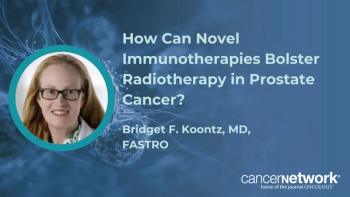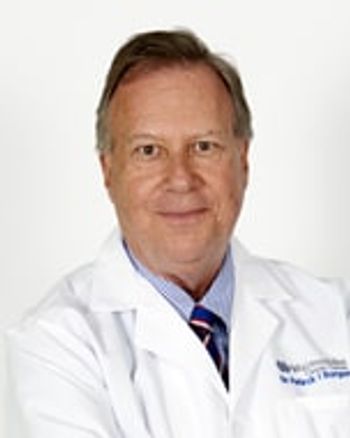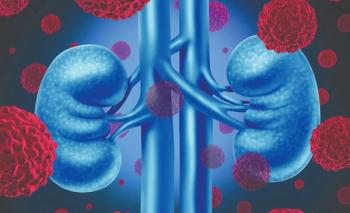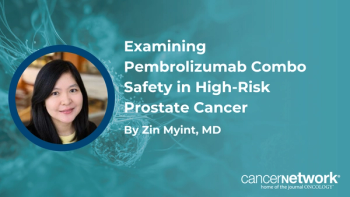
Oncology NEWS International
- Oncology NEWS International Vol 5 No 12
- Volume 5
- Issue 12
Growth Factor in Elderly ALL Patients Improves Outcome
CHICAGO--Findings from the Cancer and Leukemia Group B (CALGB) may support the routine use of G-CSF (Neupogen) during the induction phase of therapy in elderly patients with acute lymphoblastic leukemia (ALL), Richard Larson, MD, said at the Ninth Annual Meeting of the Network for Oncology Communication & Research, based in Atlanta.
CHICAGO--Findings from the Cancer and Leukemia Group B (CALGB)may support the routine use of G-CSF (Neupogen) during the inductionphase of therapy in elderly patients with acute lymphoblasticleukemia (ALL), Richard Larson, MD, said at the Ninth Annual Meetingof the Network for Oncology Communication & Research, basedin Atlanta.
Although the trials--randomized, double-blind studies of G-CSFconducted by CALGB institutions since 1991--included only a smallnumber of elderly patients, Dr. Larson feels that the findingsare clear-cut in this age group, thus justifying routine use ofthe growth factor in this situation.
In these trials, elderly patients (age 60 or older) with ALL whowere given G-CSF took the same time to recover 1,000 granulocytesas did younger individuals given G-CSF (median, 16 days versus15 days for those under age 60). "That was somewhat unexpected,"said Dr. Larson, associate professor of medicine, University ofChicago.
In addition, when compared with placebo, G-CSF produced a muchquicker recovery of granulocytes in elderly patients. Comparedwith those given G-CSF, recovery of 1,000 granulocytes took 6days longer in younger patients who received a placebo; it took13 days longer in elderly patients given placebo.
More important, this difference appeared to affect remission rates,Dr. Larson said. G-CSF patients under the age of 60 had a 92%complete response rate, compared with 86% for the placebo group.The complete response rate for G-CSF patients over the age of60 was 85% versus only 69% for elderly patients given placebo.
Effects in Younger Patients
The effects of G-CSF and GM-CSF are less clear in younger patients,Dr. Larson said. Several major clinical trials of these growthfactors in the treatment of ALL in the United States and Europehave failed to demonstrate any improvement in complete responserate in this younger age group.
One trial by the Eastern Cooperative Oncology Group (ECOG) ofpatients with acute myeloid leukemia (AML) showed a statisticallysignificant effect on survival following administration of GM-CSFamong patients aged 55 to 70. Median survival was 11 months forpatients in the GM-CSF group but only 5 months for patients inthe placebo group.
However, the median survival rates for patients in the placeboarm of the trial were among the worst recently published, Dr.Larson said. "If the standard arm of the trial looks bad,the experimental arm will look better," he noted.
Patients in these studies had a more rapid recovery of neutrophilsfollowing the administration of GM-CSF (median, 14 days for growthfactor versus 21 days for placebo in the ECOG trial and similarresults in the other trials).
However, Dr. Larson noted that in both younger adults and olderpatients "there was no consistent decrease in morbidity andmortality, no consistent increase in complete response, and nooverall survival benefit."
Thrombopoietin in AML Patients
To date, hematopoietic growth factors such as GM-CSF and G-CSFhave not proved to be especially beneficial for patients withAML, Dr. Larson said. Megakaryocyte growth and development factor(MGDF) may be a different story, however.
MGDF is a human-derived thrombo-poietin that is being tested asa supportive measure for patients with acute myeloid leukemiaat the University of Chicago and five other centers across thecountry in a double-blinded, randomized clinical trial.
"There is potential for MGDF to have a marked impact on therecovery of platelets, which has been one of the major complicationsin getting patients through multiple courses of intensive therapy,"he said.
Articles in this issue
over 29 years ago
AHCPR to Fund Analysis of the Impact of Managed Care's Growthover 29 years ago
Avon Funds Breast Cancer Awareness Program for Orthodox Jewish Womenover 29 years ago
Friends of Cancer Research Campaignover 29 years ago
Four Cancer Chemoprevention Trials Seek Subjectsover 29 years ago
Overall US Cancer Mortality Rate Falls for the First Timeover 29 years ago
Four Scenarios Describe Impact of Cancer Research in 2015over 29 years ago
New Edition of NABCO Breast Cancer Resource List Is Now Availableover 29 years ago
Changes in Congressional Committee Chairmen Could Impact OncologistsNewsletter
Stay up to date on recent advances in the multidisciplinary approach to cancer.



















































